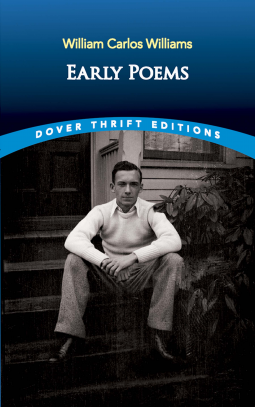
Early Poems
by William Carlos Williams
This title was previously available on NetGalley and is now archived.
Send NetGalley books directly to your Kindle or Kindle app
1
To read on a Kindle or Kindle app, please add kindle@netgalley.com as an approved email address to receive files in your Amazon account. Click here for step-by-step instructions.
2
Also find your Kindle email address within your Amazon account, and enter it here.
Pub Date May 20 2015 | Archive Date Sep 30 2015
Description
This fine selection offers readers the opportunity to study and enjoy the richness and variety of Williams's early work. More than 70 poems, published between 1917 and 1921, include "Peace on Earth," "Tract," "El Hombre," "Danse Russe," "Keller Gegen Dom," "Willow Poem," "Queen-Anne's-Lace," "Portrait of a Lady," "The Widow's Lament in Springtime," and many others.
Available Editions
| EDITION | Other Format |
| ISBN | 9780486292946 |
| PRICE | $3.00 (USD) |
Average rating from 14 members
Featured Reviews
 Kaye T, Reviewer
Kaye T, Reviewer
a good collection of his poems, and it is nice they are into categories from books and years. Lots of poems of snow and storms, so it is perfect in the middle of summer. Also, love the first poem, where he dances naked in front of the mirror. Doesn't everyone? Would recommend. A good and quick read of poetry, for those who may think they do not like poetry. Hope that makes sense. Would recommend, although wish it was longer and had some images.
 Joseph S, Reviewer
Joseph S, Reviewer
Early Poems by William Carlos Williams is a collection of the poet's early work from Dover Thrift Publications. Born in America in 1883 Williams is a contemporary of Ezra Pound and Willaim Frost. His work is associated with modernism and imagism. Williams work reflects the American identity of poetry breaking away from the strict British and European form. It was a raw, fresh, and grew from the American experience.
This is a collection for those who think they might like poetry but are afraid of the baggage that accompanies poetry interpretation. Williams style is simple and contains plenty of imagery that any reader can easily understand by all.
There is a bird in the poplars!
It is the sun!
the leaves are yellow little fish swimming in the river.
The bird skims above them,
day is on his wings.
...
~ Metric Figure
Williams not only examines nature but man-made objects like harbors and includes a lengthy poem on a train station, "Overture to the Dance of Locomotives", which is perhaps my favorite from the collection. There is nothing complicated to the reading. It can be read simply for enjoyment without worry of iambic meter, fertility references, or fear that your thinking of the poem is wrong. Thoroughly an enjoyable collection poems. This edition is available as an ebook for just over two dollars also eliminated the worry of spending too much money on a subject that the reader is unfamiliar with. A very worthwhile addition to anyone's library.
 Titivillus B, Educator
Titivillus B, Educator
Excellent insight into the formative w.ork of the imagist poet. Highly recommended for any Williams' scholars.
 Susan D, Reviewer
Susan D, Reviewer
William Carlos Williams was known for creating poetry from everyday experience and using the language of American life to form it. This introductory book provides over 70 examples of that poetry, examples that sometimes stunned me with their beauty or aptness, occasionally confused me as I was completely unable to catch the meaning of the words--even though they are the every day words. I found it to be a curious mix.
But when a poem stunned or caught me, I found it to be one that I knew I would want to read again. (In fact, those that perplexed me the most I read 2 or 3 times to try to parse out what I might be missing.) Maybe I was simply trying to dig too deep and the beauty or meaning was on the surface.
Among my favorites is "To Waken an Old Lady." From that poem:
Old age is a flight of small cheeping birds skimming bare trees above a snow glaze.
Gaining and failing they are buffetted by a dark wind---
Other poems I liked, in no particular order except how I find them now in the book, are Blizzard, Willow Poem, Overture to a Dance of Locomotives (really wonderful), The Widow's Lament in Springtime, Apology, Spring Storm, Dedication for a Plot of Ground, A Portrait in Greys, To a Solitary Disciple, Dawn, Love Song, and Tract. There are so many poems that I want to read again and some that I did read again as while writing this review. Some I find I am actually liking even more.
I will read more of Williams' poetry in the future. Isn't that the perfect outcome to reading an introductory volume?
A copy of this book was provided by the publisher through Netgalley in return for an honest review.
EARLY POEMS
(Dover Edition)
Written by William Carlos Williams 2015, 64 Pages Genre: poetry
(I received an ARC from the NETGALLEY in exchange for an honest review.).
★★★★
I like Williams' poetry but I think I am more partial to his latter work. I still enjoyed this collection enough to leave it on my eReader to reread.
k (My Novelesque Life)
Readers who liked this book also liked:
John Kotter; Holger Rathgeber
Business, Leadership, Finance, Nonfiction (Adult)


















